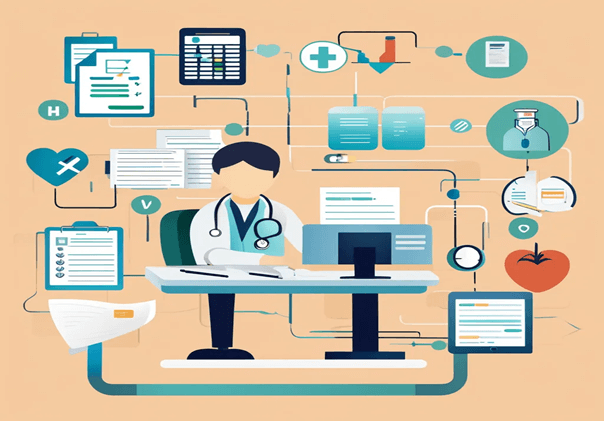Transforming Healthcare: A Look into the Electronic Health Records (EHR) Market
Published Date: 28 Sep 2024
Imagine walking into a doctor's clinic where all your health-care history is available on their computer screen. All your recent visits, lab results, allergies, medicine, and other important information in real-time. This is the future of EHRs and revolutionizing healthcare-something that would be patient-centered, connected, and efficient. EHRs are transforming the face of the healthcare industry from slow, less intelligent, and less collaborative to a fast, smart, and more collaborative industry through streamlined operations and bettering the outcome of patients.

1. Introduction to EHRs: A Historical Perspective
For the first time, electronic health records replaced paper medical records in the 1960s; afterward, the format of record-taking changed from the older problem-oriented record to the more modern record plan. EHRs are electronic copies of patients' paper charts containing their medical and treatment history. On the other hand, EHRs offer access to data immediately, thus enabling healthcare providers to collectively decide on in-and-out-of-system and service settings.
2. Technological Advancements Shaping the EHR Market
a. Cloud-Based EHRs
It has transformed the practice of any healthcare provider for storing and retrieving any information on patients. Cloud EHRs have several advantages that make them better than the on-premises systems. Scalability, flexibility, and no more high initial costs are some of the advantages. The cloud model provides support for data security as well. These data centers are secure places where patient records are kept along with advanced encryption.
b. AI and Machine Learning
It becomes possible to scan big files of data related to any patient promptly, using AI-based tools, and look for trends in the disease progression as well as aid in making an appropriate diagnosis. AI-based clinical decision support systems are used within the EHR suites that provide a healthcare professional with real-time recommendations related to the medical history of the patient. They can improve the efficiency of care.
c. Telemedicine Integration
The rapid expansion of telehealth services across all geography, mainly due to the COVID-19 epidemic, presents new opportunities for EHR system integration with telemedicine platforms. With seamless integration of EHR systems using telehealth applications, providers can provide any combination of physician-led treatment, continued patient monitoring, remote consultations, prescriptions, and follow-up care in one integrated platform.
d. Personalized Medicine and Genomics
The trend toward personalized medicine will also propel the EHR market. As this grows and healthcare becomes more and more based on genomics, EHRs will contain larger bodies of genetics, which will allow healthcare providers to generate treatments tailored to their patient's genetic profiling, lifestyle, and medical history.
3. Challenges in the EHR Market
There are certain challenges also that need to be resolved-
a. Data Security and Privacy Concerns
This is a matter of health record digitalization involving cybersecurity aspects. Healthcare providers have been the most susceptible to cyber-attacks due to the nature of sensitive information they hold. The data breaches and the confidentiality breaches concerning the patients should be improved to protect the security of the EHR system.
b. High Costs of Implementation
Generally, high costs for initial EHR system applications are quite cost-prohibitive to most small and rural healthcare providers. Costs include actual purchase of the software, training staff, then ongoing maintenance. They therefore would not be able to roll out EHR systems without some form of financial support or incentive.
4. The Future of EHRs
Health care is transforming, and at the heart of it lies this changing shift that EHRs lead. The market for EHRs has a bright future because the continuous innovation in AI, cloud computing, and data interoperability will continue to change the way healthcare is delivered. EHR platforms in the future will be much more patient engagement-friendly, where patients play an active role in their healthcare journey. With a patient portal and mobile applications combined with an EHR system, patients can view access to their records, lab results, appointment schedules, and communication with their healthcare providers. Indeed, EHRs will play cardinal roles as the health systems continue their digitization on the way toward shaping the future of healthcare by improving care coordination, enhancing patient outcomes, and reducing costs. New value-based care models do increasingly dominate the scene, and EHRs will have greater roles to play in patient outcome tracking, chronic conditions management, and efficient and cost-effective delivery of care. This unlocks all the potential EHR systems can have with specific reductions in challenges in cost, interoperability, and security in EHR systems that shall change the health face of the future.
Maximize your value and knowledge with our 5 Reports-in-1 Bundle - over 40% off!
Our analysts are ready to help you immediately.
